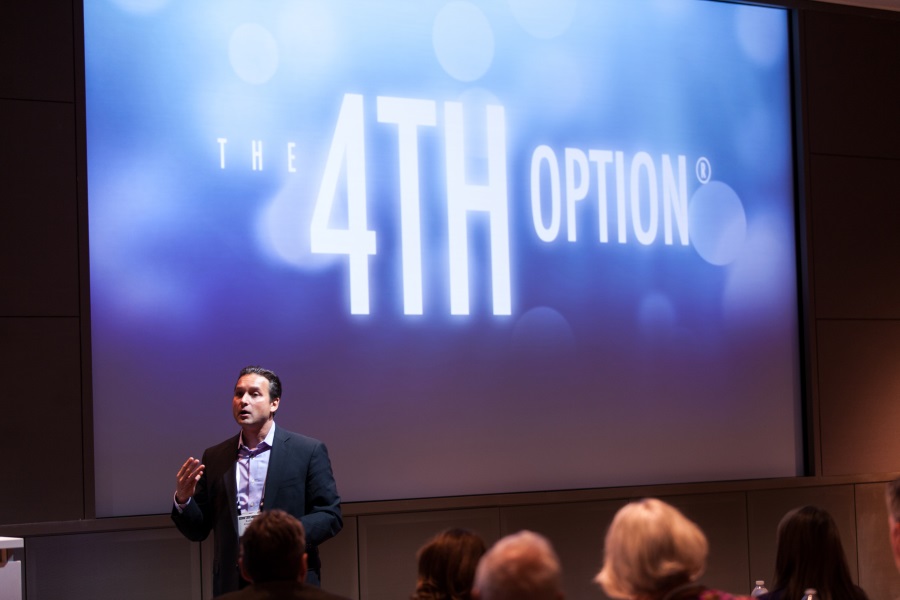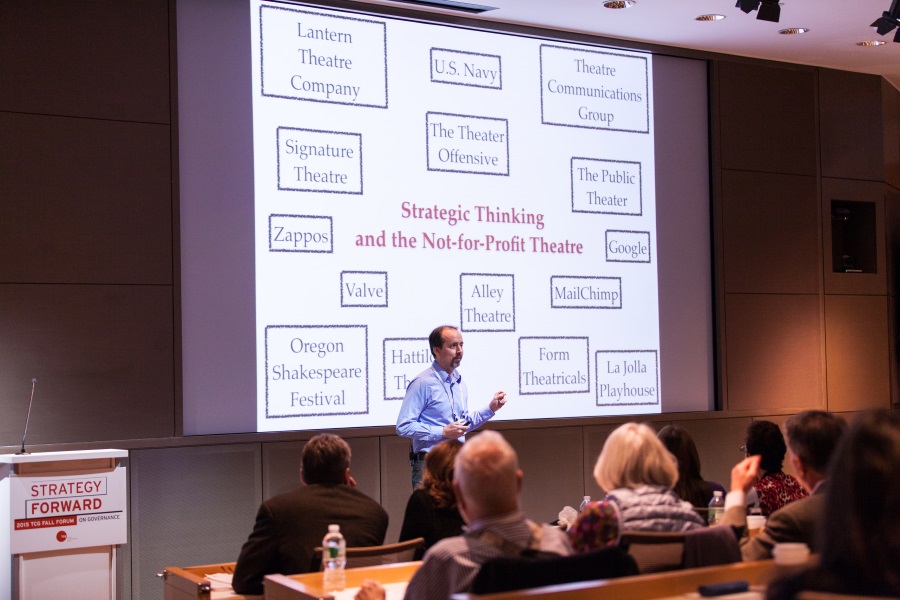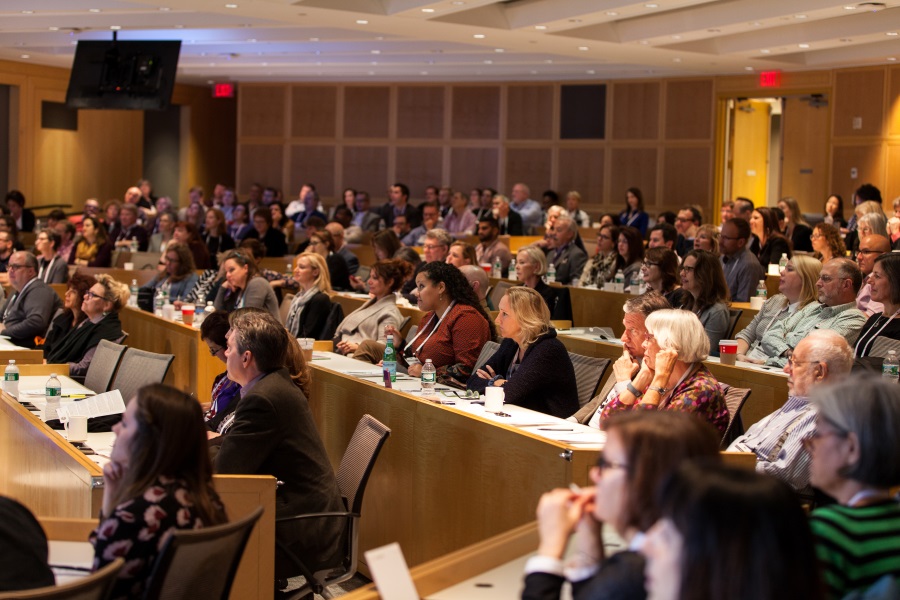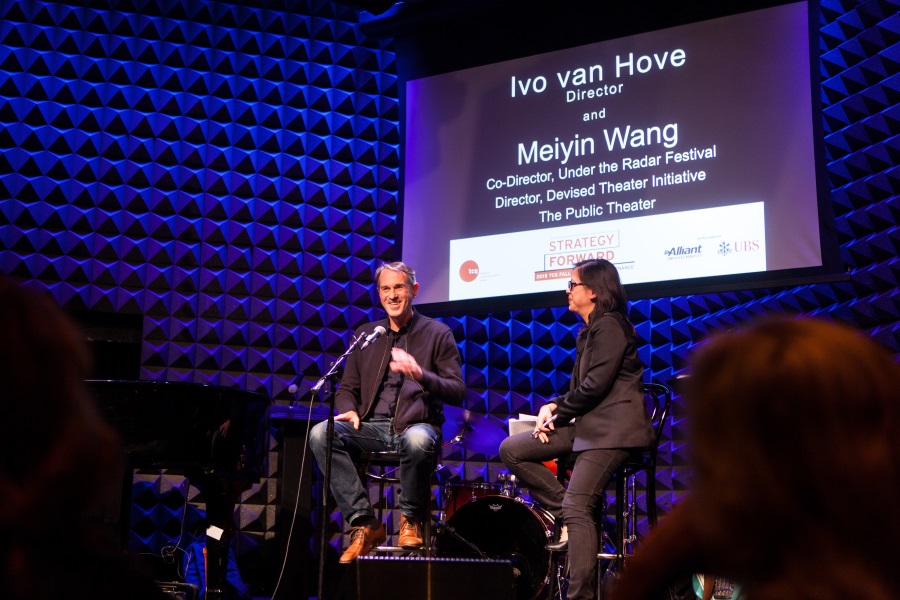NEW YORK CITY: So what’s the plan?
Theatre folks are creative problem solvers and keen thinkers when it comes to mapping out season programming and resolving last-minute onstage mishaps. But what about when it comes to planning long-term capital campaigns or lengthy leadership transitions? The theme of this year’s Theatre Communications Group Fall Forum was “Strategy Forward,” and was in some ways a continuation of last year’s event, which centered on overcoming the aftermath of the 2008 financial crisis and recession.
But the central discussion this year was not just about how to survive but how to thrive. More than 255 attendees, speakers, and TCG staff members gathered in New York City Nov. 6–8 to discuss their game plans and work together to compare notes on the best ways to set strategic plans into motion for the future.
The festivities began on Friday evening at Joe’s Pub at the Public Theater, where forumgoers met, mingled, and united for a night of entertainment. Patrick Willingham, executive director of the Public, kicked off the weekend’s theme with a welcome speech. “I love strategy!” he enthused. “When I saw that the Fall Forum was about strategy, I was one of the first to sign up.”
After toiling in the for-profit theatre world for decades, Willingham began his job at the Public four years ago and started regularly attending TCG events. “It was a moment,” he said, “when I realized that there are colleagues scattered throughout the country that I can now connect with.”
Meiyin Wang, co-director of the Under the Radar Festival at the Public and TCG board member, conducted an interview with the Belgian director Ivo van Hove as the first keynote speech of the jam-packed weekend. The artistic director of the Toneelgroep Amsterdam, van Hove is currently making his Broadway directorial debut with A View From the Bridge while also working on the highly anticipated David Bowie musical Lazarus at New York Theatre Workshop. “You have more New York gigs than a New York director!” exclaimed Wang.
Van Hove said that his strategy for managing his hectic global projects and theatre company is sticking with a team.
“My main job is to have a vision to look to day after day—except when there is a specific problem,” he explained. “But what a big institution needs is a vision. I think it is best that theatre institutions are run by artistic persons.”
The idea of balancing artistic vision and fiduciary responsibilities continued to be a running theme throughout the weekend. How can creative theatremakers at nonprofit theatres be sustainable and still manage to fairly compensate the artists?

Disrupting Innovation
Saturday morning began with keynote speaker Kaihan Krippendorf, a strategy consultant, and author of four books about innovative planning and how to outsmart competitors.
“Usually I do these presentations to for-profits—you may be coming at this from the other direction,” he said with a laugh. He illustrated one key difference between his usual clients and the TCG crowd: Most large corporations look for ways to make their profitable work morally good, he said, while theatre is already striving for excellence and needs to find ways to be profitable.
Krippendorf explained that he approaches strategic planning like a game of chess. Chessmasters, he said, don’t think of option one, two, or three to outmaneuver their rival—instead they choose option four. Krippendorf’s theories have fared well with large corporations such as Microsoft and Johnson & Johnson. But how might this theory apply to small, nonprofit theatres?
That’s where August Schulenburg, associate director of communications at TCG, came in. Schulenburg presented a carefully compiled list of resources, case studies, and research on strategy, all toward showing ways that theatres can benefit from a solid game plan.
“Strategic thinking is a bigger ballpark than just plans,” he said. “It includes everything from the long-time horizon of scenario planning to the ‘let’s move fast’ model of the lean startup.”
Indeed, Schulenburg defined types of strategy—lean startup, strategic plan, and scenario planning—and outlined the afternoon breakout sessions led by theatres embarking on strategic plans and theatres that have successfully completed a strategic planning process.
For instance, Oregon Shakespeare Festival in Ashland, Ore., just launched a scenario plan with a time horizon of 10 years. Signature Theatre in Arlington, Va., also just completed a successful traditional planning process and is now embarking on a new phase of strategic alignment. And Philadelphia’s Lantern Theater Company has made a massive comeback since the recession of 2008, creating a strategy to increase profitability without compromising the art.
California’s La Jolla Playhouse is thinking outside the box, literally, with its annual Without Walls Festival, mounting performances in cars, leading audiences members into the Pacific Ocean, and taking blindfolded audiences through the theatre’s gardens.
The Theater Offensive in Boston has taken their plan outside the theatre, as well, with a lean startup methodology. “They just went through a remarkably successful strategic planning process that was all about getting out of the building and iterating, adapting, and evaluating the programming,” said Schulenburg. “And the programming that worked? It scaled up, and their organization has been radically transformed by that process.”
A survey conducted before the forum showed that 40 theatres in attendance had successfully completed a strategic plan in the last 3 years, while 18 theatres had never been involved in a strategic process. A study also showed that net assets were up 30 percent over the last 10 years—so some strategic planning has definitely been taking place. Explaining the appeal of strategy, Schulenburg said, “It is so exciting to imagine that we can bring the future into our hands and that we can change it.”

Rekindling the Lantern
In the wake of the financial crisis and downturn, the Lantern Theatre Company in Philadelphia sought solace in strategic planning to weather the economic turmoil. But the theatre made a hasty, and in retrospect suboptimal decision to cut production costs and to produce plays with smaller casts.
“The artistic choices were compounding what was happening in the external environment,” conceded Stacy Dutton, president of the theatre’s board. While the quality of the shows was not compromised, said artistic director Charles McMahon, “the perceived ambition went down.” The result was that 2009–10 season saw a dramatic decrease in single-ticket sales, a growing deficit, and a disgruntled board.
The first step in the theatre’s new plan was to turn over the board. The next was to redefine staff roles and create a shared leadership plan; the company tossed out traditional organizational charts and focused on becoming team-oriented, deemphasizing titles and focusing on cross-training. This seems to have paid off: This year subscriptions are up 60 percent, earned income is up 52 percent, and there’s an operating surplus of 7 percent, zero debts, and a record level of unrestricted net assets.
The numbers speak for themselves, but the Lantern’s strategic planning set even higher goals. In 2012, McMahon pitched a Fair Pay initiative to increase the pay for artists by 50 percent by the 2014–15 season. “That was too big an idea for me to wrap my head around,” said Dutton. “But I’ve become a convert.” The board is now more open to the big, passionate ideas from the artistic leaders, and the $400,000 Fair Pay project is now also complete.
Hattiloo Theatre in Memphis, Tenn., also has a hardline principle of not allowing business ventures to compromise the theatre’s work. Ekundayo Bandele, Hattiloo’s artistic director, said he doesn’t believe in debt or in asking for donors outright. After moving from a storefront theatre in the small Tennessee town of Marshall to the more affluent city of Memphis, the theatre saw its audience change from 90 percent African-American patrons to closer to 70 percent.
But instead of approaching big corporations in Memphis, like Nike or International Paper, to ask for donations, the theatre worked backwards.
“Nike has little groups within its corporations, so we would do free Christmas parties for those diversity groups,” he explained. “We would give them a block of tickets—mind you, we are losing money, but then they come back and buy tickets.”
After offering a 50 percent discount on tickets and tracking data of which organizations audience members worked for, Hattiloo then singled out which companies to ask for support, on the grounds that a majority of their employees were already enjoying the theatre’s programming.
La Jolla Playhouse’s Without Walls (WoW) festival sprang from an initiative by a cohort of staff members who were given $35,000 to execute an idea. With a shared leadership model, the artistic leaders sold tickets, public relations managers produced the plays, and the outdoor festival went up. The theatre’s next plan of action is to work on diversifying the staff.
“As a board, we need to start thinking about how we as an organization set the table so that the next artistic director or the next managing director of La Jolla Playhouse does not look like us two white guys—how do we change that?” said managing director Michael Rosenberg. Indeed, the three largest theatres in San Diego are led by six white men. “That’s ridiculous in a city that looks like ours; it’s ridiculous in any city.”
TCG’s core values include a push for equity, diversity, and inclusion (EDI).
EDI work became a stronger focus within TCG’s own strategic plan after a field-wide survey revealed the topic of EDI as a matter of concern. In 2012, TCG partnered with Carmen Morgan, the founder of artEquity, to bring EDI conversations into grant-making, convenings, board recruitment, and office culture.
“Look at the theatre field,” said TCG executive director Teresa Eyring. “Some members of our board said our field is still structurally mimicking the weakness that exists in a larger society in terms of equity, resources, access to jobs, and access to who gets to experience theatre.”
At a lunch salon the leaders of theatres of color, they discussed action items to continue the conversation about advocacy and equity and help shape further dialogue at the TCG 2016 conference, to be held next June in Washington, D.C.

The Future Is Nigh
The last keynote speaker of the weekend was David Evan Harris, research director at the Institute for the Future and founder of the Global Lives Project.
Harris started Sunday morning off by “orienting the future” and asking attendees to move to different sides of the room depending on their answers to binary questions of where they see theatre in five years, if they would define themselves as risk-takers, and if technology is a positive tool.
Harris also addressed the topic of implementing a fluid hierarchy, a tactic that has proved successful for such organizations as La Jolla Playhouse, Lantern Theatre, and Hattiloo. Harris advocated for technology and social media in future theatremaking, and outlined some tips for the future, including Loomio, an app used to help facilitate decision-making in large groups.
As a way to send off the crowd with a concrete plan, Devon Berkshire, associate director of conferences, Dafina McMillan, director of communications and conferences, and Schulenburg led a game of “question the question.” Attendees presented the topics and questions they planned to address when they returned to their home theatres, and worked together to unlock difficult questions. By the end of the session, everyone in the room had a more polished approach to tackling the issues of fundraising, outreach, marketing, and programming.
During plenaries, coffee breaks, lunch salons, and breakout sessions, topics covered at past forums were came up as often as topics from the current one.
“Clearly people are learning something, taking it back to their theatres, continuing the conversation, and incorporating it into their work,” said Eyring. “I am already looking forward to next year and hearing how what you’ve learned about planning will be incorporated into your own theatre’s plans, and how it is affecting your local ecologies and the ecology of our nationwide theatre.”


